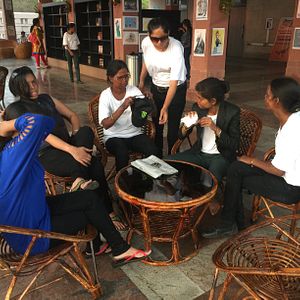When Ritu Saini tells her story, she doesn’t show any anger. She is completely at peace with the pain that life has inflicted on her.
She grows excited when she talks about her days as a basketball player in Haryana, the state she once represented. But in 2012, an acid attack on her by her cousin, whom she rejected, cut short a budding career and ended her dreams of playing for the country. Four years later, Saini still harbors a desire to be an athlete. But regaining the confidence to lead a normal life does not come so easily to the victims of acid attacks in India.
The victims, mostly women, are isolated from their families and society at large; they become complete pariahs in their own surroundings, where they have grew up. Once their faces are disfigured after the attack, acceptability is beyond question and many are forced into an existence as the living dead.
The Stop Acid Attacks campaign started three years ago and has come as a great relief for these unfortunate victims of barbarity. The campaign serves as “a bridge between survivors and the society, as most of the victims of this brutal crime … have isolated themselves after losing their face.”
The campaign not only created awareness about the issue, but also brought survivors of acid attacks face-to-face with a society that had been living in denial of this horrid phenomenon.
“The campaign is now in the second phase,” says Alok Dixit, the main brain behind the campaign. “There is a law to deal with such attacks, but the challenge is how to implement it effectively.”
“The second challenge is to change the mindset of the people and integrate acid attack victims into India’s mainstream society and consciousness,” he adds.
Cafe Sheroes is an attempt to take matters in that direction. The first of its kind in India, the cafe, run and maintained exclusively by survivors of acid attacks, is a serious effort to engage society with the victims.
“Sheroes is an attempt not only to provide jobs, but also to change the mindset of the people; to develop a soft corner in their minds for the victims and sensitize them to the issue. People should be engaged and survivors should be brought to the mainstream,” argues Dixit, who managed to open Cafe Sheroes in Lucknow on March 8, International Women’s Day, with generous help from the Uttar Pradesh government.
“Despite support from my family, I was feeling uneasy, left out, and isolated. My life got a new meaning when in 2014 I joined the Stop Acid Attacks campaign. I started living life afresh,” says Saini. “I had stopped wearing red dresses after the attack because the day I fell victim I was wearing a red garment. When I joined the campaign, everyone offered me a red dress and we celebrated by cutting a cake. That time I realized I have to do something in life. Not everything is lost. Now I manage accounts for Sheroes,” she told The Diplomat.
She believes that it is particularly important for men to realize the pain of an acid victim and, through the cafe, she and women like her want to narrate the anguish of the victims.
“I never felt that anyone should be hanged to death or that anyone should get a life term in prison for the crime committed against me. I feel that when the culprits come out of prison, at least they should realize that they have made a mistake and make sure that such incidents don’t take place in our society. No one should be attacked that way,” she says.
Sonia, 31, also believes that men’s mindsets need to change. She fell victim to her neighbor’s vindictiveness in 2004 in Ghaziabad, a suburb near Delhi. She completely lost one of her eyes and her face melted. After living an isolated life for many years, she has found a sense of purpose in her life by joining the Stop Acid Attacks campaign. She now wants to realize her ambition to be a beautician and, with support from civil society, she is going to open a parlor in New Delhi.
“Very soon I will be opening a salon in Delhi with the help of the group. I feel that the way I can come to realize my dreams, other survivors should also be able to live theirs. I want to train them and make them confident,” she adds. Sonia no longer likes to cover her face.
Giving inspiration to all these survivors is Laxmi, 26, a survivor who was attacked by a 32-year-old man for rejecting his advances in 2005 at the tender age of 15. She and Alok are at the forefront of the campaign and have given hope to many survivors. Putting her tragedy behind her, Laxmi not only broke free, but also became a spokesperson on behalf of India’s acid attack victims. She now works as a television host and a model, devoting a major part of her time to working with other survivors.
“You ask for a job; you don’t get it. Even people don’t like to talk to you,” says Laxmi, who is now the mother of one-year-old baby. “Someone has to come forward. Had we not raised our voice, we would not have been here in front of you today. Change has come. Fighters have emerged.”
Cafe Sheroes, thus, is not just a hangout; it is an open home for India’s acid victims. The name Sheroes itself derives from the word ‘heroes.’ Women like Ritu, Sonia, Laxmi, and many others are the real ‘sheroes,’ who have not let tragedy blunt their outlook on life.

































